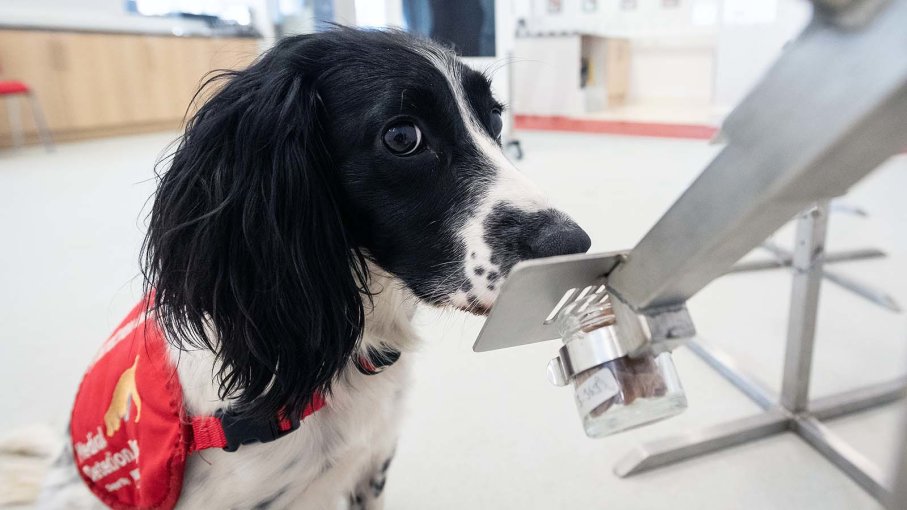Dogs Are Being Trained to Sniff Out Coronavirus in Humans

We are months into the coronavirus pandemic and testing and treatment still remains limited. That’s led researchers to look for out-of-the-box ways to manage the crisis. And one of those solutions is significantly cuter than the others: coronavirus-sniffing dogs.
But, while adorable, these pups are diligent workers. Just like trained dogs can detect health issues like diabetes, cancer or Parkinson’s, canines could have the power to detect coronavirus in humans. One such group is the U.K.-based nonprofit Medical Detection Dogs, which successfully proved trained dogs can detect malaria. They are now studying whether or not dogs can use their super-sensitive scent for coronavirus detections, too.
Medical Detection Dogs is collaborating with the London School of Hygiene and Tropical Medicine (LSHTM) and Durham University in England, which were also research partners on the dog-detection malaria study. With the trio’s intensively pre-trained test dogs, they could be ready to provide rapid, noninvasive COVID-19 diagnosis by as early as mid-June 2020.
How Would a Dog Detect Coronavirus?
Dogs skilled to sniff out coronavirus would be trained relatively similarly to pups who detect diseases like cancer. For that process, dogs use their highly sensitive noses to sniff the cancerous fumes that waft from the diseased cells, according to Live Science. These cancerous cells have specific odors that humans can’t smell, but pups can. Medical Detection Dogs’ pups smell samples from urine, breath and swabs to sniff out the disease.
And the sniffing skills extend to myriad other diseases, including, as Medical Detection Dogs, LSHTM and Durham University proved, malaria. People infected with malaria smell more attractive to mosquitoes than those not infected, the study found. Canines can pick up on that scent, too, with an impressive accuracy record that’s above the World Health Organization’s diagnostic standards.
Now, this trio of research groups is trying to uncover the odor put off by COVID-19. “We know that other respiratory diseases like COVID-19 change our body odor, so there is a very high chance that dogs will be able to detect it,” professor James Logan, head of department of disease control at LSHTM said in a news release. “This new diagnostic tool could revolutionize our response to COVID-19 in the short term, but particularly in the months to come, and could be profoundly impactful.”
coronavirus-sniffing dog
Bio-detection project specialist Mark Doggett hopes to retrain Freya to detect samples of COVID-19 at the Medical Detection Dogs headquarters in England by as early as mid-June 2020.
LEON NEAL/GETTY IMAGES
How Would Dogs be Used in the Future?
Asymptomatic carriers are frequent (and inadvertent) COVID-19 spreaders. They don’t realize they have it, and can therefore spread the virus unknowingly. This is a major risk given studies show up to 25 percent of COVID-19 carriers could be asymptomatic.
That’s where coronavirus-sniffing dogs could come into play. These trained pups could be used for wider-scale, noninvasive testing. They could screen up to 250 people per hour if the study proves successful.
“Our aim is that COVID-19 detection dogs will be able to passively screen any individual, including those with no symptoms, and tell our dog handlers whether they have detected the virus,” Gemma Butlin of Medical Detection Dogs says via email. “This will then need to be confirmed by a medical test. This would be fast, effective and noninvasive and make sure the limited testing resources are only used where they are really needed.”
While the dogs would be able to sniff out coronavirus virtually anywhere, some of the most important places include public gatherings and airports. They could rapidly identify people carrying the virus in these high-traffic places to prevent re-emergence through inadvertent spreading, according to the Medical Detection Dogs news release.
How Likely Is the Project’s Success?
The question isn’t if the dogs can sniff out the COVID-19 virus, it’s whether the virus has a characteristic odor. So far, the researchers have yet to prove that COVID-19 has a distinctive odor, according to this research project’s Indiegogo fundraising page. If it does, however, the groups are confident the dogs will be able to detect it.
Other possible hiccups include whether the dogs can replicate detection in the field versus the laboratory (this hasn’t been an issue in previous studies), and scaling up if this study proves successful. That’s why Medical Detection Dogs engaged airports and the National Health Service (NHS) in this study from the get-go.
But there’s one other, potentially research-ending, hiccup: funding. Medical Detection Dogs is a charity, so its research hinges on external funding, and this project alone requires $1.2 million. That’s why LSHTM launched an Indiegogo fundraising campaign for help; the team is also “having conversations with government at the highest level” to help with funding, according to Butlin. If the study proves unsuccessful, researchers will donate unspent money to the COVID-19 Response Fund.



 Creators of mankind
Creators of mankind Description of “Tall white aliens”
Description of “Tall white aliens” Where they came from?
Where they came from? About hostile civilizations
About hostile civilizations The war for the Earth
The war for the Earth “Tall white aliens” about eternal life
“Tall white aliens” about eternal life Video: “Nordic aliens”
Video: “Nordic aliens” Aliens
Aliens Alien encounters
Alien encounters The aliens base
The aliens base UFO
UFO Technology UFO
Technology UFO Underground civilization
Underground civilization Ancient alien artifacts
Ancient alien artifacts Military and UFO
Military and UFO Mysteries and hypotheses
Mysteries and hypotheses Scientific facts
Scientific facts


















